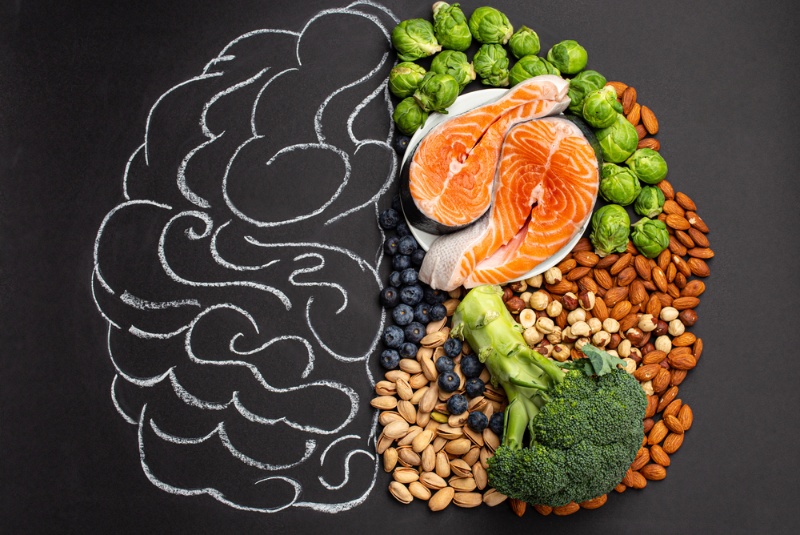Maintaining brain health is essential for cognitive function, memory, and overall mental well-being. What we eat plays a significant role in supporting our brain's health and can enhance cognitive functions, including concentration, memory, and problem-solving skills. A diet rich in certain nutrients can protect the brain against degeneration and support its functions. This article explores various foods and dietary patterns known to boost cognitive function, offering insights into how you can nurture your brain through diet.
Omega-3 Rich Foods
Fatty fish like salmon, trout, mackerel, and sardines are excellent sources of omega-3 fatty acids, crucial for brain health. Omega-3s help build membranes around each cell in the body, including brain cells, thereby improving the structure of brain cells called neurons. A diet rich in omega-3s can enhance cognitive function, especially as one ages. Studies have shown that omega-3s can slow cognitive decline and help prevent Alzheimer’s disease. Incorporating fatty fish into your diet a few times a week can provide the omega-3s your brain needs to function optimally.
Antioxidant-Rich Berries
Berries, such as blueberries, strawberries, and blackberries, are rich in antioxidants, including flavonoids, which have been shown to improve communication between brain cells, reduce inflammation throughout the body, and increase plasticity, which helps brain cells form new connections, boosting learning and memory. Antioxidants also help to reduce stress and inflammation, conditions that can contribute to brain aging and neurodegenerative diseases. Regular consumption of berries can lead to a variety of brain health benefits, including improved memory and cognitive function.
Whole Grains for Energy
Whole grains are a key component of a brain-healthy diet. Foods like oats, barley, and quinoa are rich in fiber and help to regulate the release of glucose into the bloodstream, providing a steady source of energy for the brain. Since the brain depends on a constant energy supply to function effectively, a diet that includes whole grains can support cognitive function, concentration, and focus throughout the day. Opting for whole grains over refined grains can also contribute to overall cardiovascular health, which is closely linked to brain health.

Nuts and Seeds
Nuts and seeds are good sources of the antioxidant vitamin E, which has been shown to protect cells from oxidative stress caused by free radicals. As a person ages, their brain may be exposed to more oxidative stress, and vitamin E can help support brain health during this process. Almonds, hazelnuts, sunflower seeds, and flaxseeds are among the foods high in vitamin E and also contain healthy fats, antioxidants, and fiber. Regular consumption of nuts and seeds can contribute to better cognitive function and reduce the risk of Alzheimer’s disease.
Leafy Green Vegetables
Leafy greens such as kale, spinach, collards, and broccoli are rich in brain-healthy nutrients like vitamin K, lutein, folate, and beta carotene. Research suggests these plant-based foods may help slow cognitive decline. Leafy greens are also high in antioxidants and fiber, promoting overall health and well-being. Incorporating a variety of leafy greens into your diet can support brain health and protect against cognitive decline.
Foods Rich in Polyphenols
Polyphenols, found in foods like cocoa, dark chocolate, green tea, and coffee, have antioxidant and anti-inflammatory effects. These compounds can improve brain function, memory, and learning and may also reduce the risk of neurodegenerative diseases. Moderate consumption of polyphenol-rich foods can contribute to brain health, although it’s important to consume them as part of a balanced diet to avoid excessive calories or caffeine.
The Mediterranean Diet for Cognitive Health
The Mediterranean diet, rich in fruits, vegetables, nuts, seeds, olive oil, and fish, is widely recognized for its benefits to heart and brain health. This diet pattern emphasizes whole foods and healthy fats, contributing to reduced inflammation and oxidative stress in the brain. Following a Mediterranean diet can improve cognitive function and reduce the risk of developing neurodegenerative diseases.
Hydration and Brain Function
Staying adequately hydrated is crucial for maintaining optimal brain function. The brain is highly sensitive to dehydration, which can affect cognitive performance, including concentration, alertness, and short-term memory. Water is essential for delivering nutrients to the brain and for removing toxins. Even mild dehydration can lead to fatigue, moodiness, and difficulties in concentration. Ensuring regular intake of fluids throughout the day can support overall brain health and cognitive performance. It’s recommended to drink at least 8 glasses of water daily, but the exact needs can vary based on activity level, climate, and individual health. Incorporating water-rich foods like cucumbers, tomatoes, and watermelon into your diet can also contribute to hydration and brain health.
Probiotics and Mental Health
The connection between the gut and brain, often referred to as the gut-brain axis, highlights the role of gut health in cognitive function and mental well-being. Probiotics, found in fermented foods like yogurt, kefir, sauerkraut, and kimchi, can promote a healthy gut microbiome, which in turn can positively affect brain health. These beneficial bacteria can produce and regulate various neurotransmitters and neuropeptides essential for maintaining brain health. For instance, the majority of the body's serotonin, a neurotransmitter that contributes to feelings of happiness and well-being, is produced in the gut. Incorporating probiotic-rich foods into your diet can help support not only gut health but also cognitive function and mental health, potentially reducing symptoms of depression and anxiety.
Eating for brain health involves incorporating a variety of nutrient-rich foods into your diet to support cognitive function and reduce the risk of cognitive decline. Foods high in omega-3 fatty acids, antioxidants, vitamins, and minerals can provide the necessary nutrients to nurture the brain and enhance mental well-being. By adopting dietary patterns that focus on these foods, such as the Mediterranean diet, you can support your brain health and improve cognitive function. Remember, a healthy brain starts with a healthy diet, and making mindful choices about what you eat can have profound effects on your overall mental fitness.




